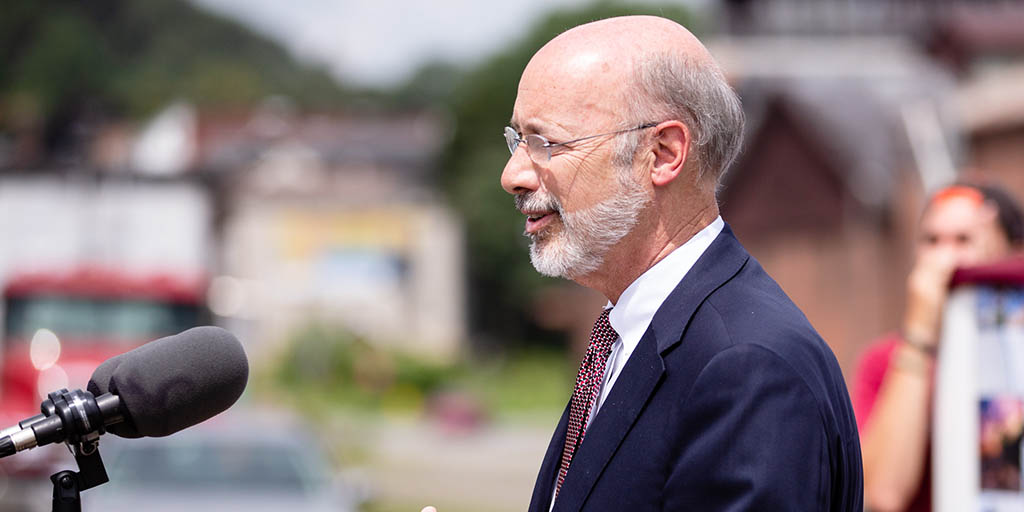
Pennsylvania Gov. Tom Wolf, speaking at a press conference, praised proposed legislation that would establish policies and programs designed to support small, diverse and veteran-owned businesses in state contracting.
The bill, SB900, was announced Monday at the Capital Media Center during an event featuring Wolf and State Department of General Services Secretary Curt Topper and Deputy Secretary for the Bureau of Diversity Inclusion and Small Business Opportunities (BDISBO) Kerry Kirkland. Sponsors of the bill, Senate Democratic Appropriations Chairman Vincent Hughes and Sen. Camera Bartolotta, were joined by state Reps. Jake Wheatley and Donna Bullock, Chair of the Legislative Black Caucus.
“We have been very successful in implementing policies and programs that give our small-, diverse- and veteran-owned businesses a fairer and more equitable chance to compete for — and obtain — contracting opportunities with state government,” Wolf said. “We also know the important role that consistency plays in ensuring the continued success of any policy or program, which is why this effort to legislatively establish the programs and policies administered through the Department of General Services Bureau of Diversity Inclusion & Small Business Opportunities is so significant.”
The legislation stems from Wolf’s 2015 Executive Order on Diversity, Inclusion and Small Business Opportunities in Commonwealth Procurement and in Pennsylvania’s Economy which ordered the creation of BDISBO, and which led to the 2018 Statewide Disparity Study that examined disparities in the state’s contracting system and made recommendations for improvement.
“The progress we’ve made is a result of the willingness of elected officials and private sector stakeholders to put politics to the side and focus on the issue at hand — helping our small, diverse and veteran businesses become stronger and thrive in our economy. This legislation is a continuation of those bipartisan efforts,” Wolf said.
The proposed legislation would establish goal-setting to establish minimum SDB participation and spending commitment levels for solicitations for construction, design professional services, supplies and services. Additionally, the legislation calls for a disparity study every five years to ensure the program is constitutional and to keep aspirational targets up-to-date. Further, the legislation removes from the definition of small business the limit of 100-employees, and allows a small business’s size and revenue limit to be established on an industry-by-industry basis, consistent with federal program eligibility requirements.
General Services Secretary Topper said the legislation would continue the state’s success in this area and have a positive effect on the small, diverse and veteran business community.
“Right now, we have more than 5,000 small, diverse and veteran businesses who will benefit from this legislation’s intent to keep programs and policies in place to provide a financial benefit for these business by making them a focus of our spending plans,” Topper said. “Hopefully, this commitment we’re making will give these businesses more confidence in becoming certified in our programs.”
Since 2015, the state has spent nearly $2.72 billion with small, diverse and veteran owned businesses. The percentage of state funds spent with those businesses has increased from 7.6 percent in 2015 to 17.9 percent in 2019.
“As the proprietor of a small, woman-owned business, I know firsthand how important this legislation is in helping small and diverse businesses to not only compete for state contracts, but also to grow and contribute to our economy,” Bartolotta said. “Small businesses are the lifeblood of our economy, and we have a responsibility to ensure that they are given the attention they deserve. With this legislation, I am confident that the Department of General Services will be able to attract more small and diverse businesses, expand the use of its programs, and strengthen our business community.”